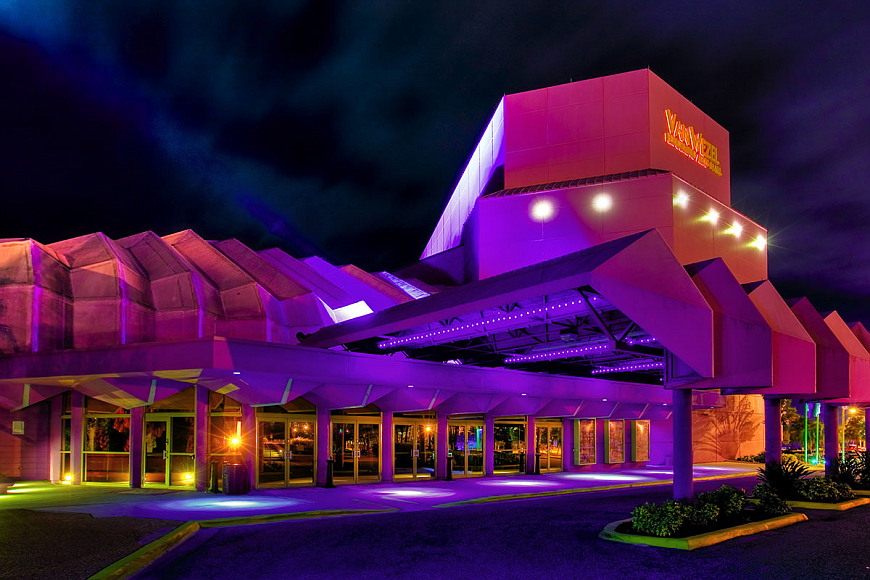- December 23, 2024
-
-
Loading

Loading

Building a new venue to replace the Van Wezel Performing Arts Hall could cost between $240 million and $270 million, a figure that could represent about two-thirds of the total expenses associated with implementing a master plan for redeveloping Sarasota’s bayfront.
On Monday, representatives for the Van Wezel and Van Wezel Foundation presented details on a proposal for a new bayfront performance center to the City Commission. The foundation said it intends to rely on a combination of public and private funds to help pay for the new building.
The Van Wezel Foundation, working with arts consultant AMS Planning and Research, developed a desired scope for the project. The 250,000-square-foot venue would feature a main hall with about 2,250 seats. An education center would provide another 400-seat theater that could be easily reconfigured. The property would also include event space inside and an “imaginative” outdoor space, according to Monday’s presentation.
A new performing arts hall is a central element in The Bay Sarasota’s master plan for more than 50 acres of city-owned land around the existing Van Wezel building. The plan calls for that existing structure to be preserved and repurposed for some other use if the new venue is built.
Absent the cost of the venue, the initial cost estimates for redeveloping the bayfront are between $100 million and $150 million, according to The Bay.
Mary Bensel, executive director of the Van Wezel, said there’s a long list of reasons why the current building is not sufficient for the organization’s programming needs. That includes the size of the auditorium, the configuration of the seats, the venue’s location in a flood zone and more.
She shared a comment from a carpenter working on the touring production of The Lion King to highlight the extent of the issues.
“He said to us, ‘I’ve seen a lot of problems in buildings across the country and across the world, but I’ve never seen them all in one building,’” Bensel said.
AMS Principal Steven Wolff said the Van Wezel Foundation has conducted preliminary business forecasts that show the organization could continue to be profitable even as it expands its operations. The group said its preliminary conversations with the philanthropic community indicate there is a desire to support the proposed project if it is part of an ambitious plan for the bayfront.
The foundation also proposed a new model for running the new performance space, if it’s built. The concept calls for the city to partner with a nonprofit entity on the development and future management of the venue. The city would own the building, but the nonprofit would be responsible for operating it in accordance with terms adopted by city officials.
If the city is interested in that model, foundation representatives asked the commission to work toward an agreement in principle that the two groups wanted to pursue a partnership. Commissioner Shelli Freeland Eddie asked the foundation to share more detailed financial information as quickly as possible, so officials could incorporate it into their planning decisions.
“That’s going to be something that binds this commission for a budgetary perspective, when we plan our capital improvement needs for the next five years,” Eddie said.
She and Vice Mayor Jen Ahearn-Koch both asked the foundation to consider opportunities for serving individuals and families that currently do not have the means to attend programming at the Van Wezel. Wolff and Bensel both shared their belief that the expanded scope would make it easier for the Van Wezel to reach underprivileged segments of the community.
“I believe the arts should be inclusive to everyone,” Bensel said. “That would be the goal of anyone that’s sitting in my chair as director of that hall.”
Wolff said the Van Wezel Foundation would give the city more details on the group’s planning and research, along with information on other performance arts centers across the country. The group’s desired next steps include strengthening the mission of the foundation, improving dialog with the bayfront planning group and preparing to launch a philanthropic campaign.
By the time the group returns to the commission in September for another discussion, it hopes to have an even firmer plan for the future of the Van Wezel. At that point, it’s optimistic city leaders will be prepared to support a significant investment into transforming a cornerstone of Sarasota’s arts community.
“It’s very exciting,” said Jim Travers, a member of the Van Wezel Foundation board.